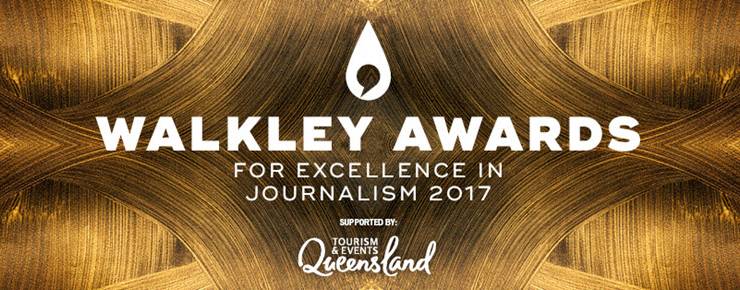
On paper, the prospect of the 2017 Walkleys was compelling. The first post-woke, post-Weinstein, Tracey Spicer-spiced Walkleys. But while the Australian media is rightly doing a lot of navel-gazing at the moment, very little of it was apparent on the night.
The choice of host was the first shining hope that this Walkleys would align itself with the current media moment: Lisa Wilkinson, in her first public appearance after becoming an equal pay icon, was an inspired choice, it seemed.
When Wilkinson invoked Weinstein in her introduction, you could hear the seats groan as old-guard men shifted uncomfortably. There’s a crackle in the air — would she mention her pay dispute, or Don Burke, or Karl’s blue suit? But the punches are pulled, and instead we get a pleasant gardening leave joke — literally seeing Wilkinson’s roses.
Also going unmentioned was Tracey Spicer, who was unfortunately not in attendance. Part of the fun of the evening could have been tracing Spicer’s eyeline to see who was avoiding it, or guessing at who was avoiding the spotlight to come.
Instead, everybody in the Brisbane Entertainment Centre seemed to be on their best behaviour in case the Sky cameras caught them, realising that Kristina Keneally will need to be replaced after the weekend.
But the positives — despite the muted tone, several mentions of asylum seeker journalist Behrouz Bouchani were met with rousing applause, and reminded us that journalism isn’t just about schmoozing and wine. And digging into the substance, this was a Walkleys packed with remarkable women.
The night’s only standing ovation was reserved for for Liz Jackson, awarded for A Sense Of Self, a documentary about her own experience with Parkinson’s disease.
Book of the year went to Louise Milligan for The Rise And Fall Of George Pell. “I want everyone to know what I know,” Milligan pleaded. The fact that her book is only available outside of Victoria due to ongoing legal proceedings is in part testament to her investigations.
By the time Helen Garner was greeted with woos for her long-form award, the point was made.
Elsewhere, Cathy Wilcox won for best cartoon and Kate Geraghty for press photographer of the year, trumping the men in the blokiest of categories. Geraghty also shared the Gold Walkley with Michael Bachelard for their work in Mosul. Geraghty wasn’t in the room — she’s on assignment in Bangladesh.
Even when Michael Gordon received his outstanding contribution to journalism award, the mention of Michelle Grattan, his first Canberra bureau chief, got the most rousing applause.
In a broader media sense, there was evidence that the old media guard is changing. Among the triumvirate of ABC/Fairfax/News, BuzzFeed’s editor Simon Crerar presented, The Guardian beat out the big networks for best TV/video camerawork and The Wheeler Centre won best radio/audio feature for their podcast The Messenger.
But at the end of the night, as the silver-haired DJ spun the Grease megamix to a thinning dance floor, you couldn’t help but think that maybe the Walkleys missed a moment.







Missed what moment? This article missed its moment, I suspect. Once again,, we see little substantial coverage of our the brightest and best our own Oz media. Is it copyright that an article like this cannot present graphics of the best cartoon, the best photograph, links to the best doco, the best investigative story etc.
We see many generalised comments about journalism’s failure, death of investigative journalism due to social media ad nauseum. When the Walkley’s are announced, there is 5/10th’s of buggerall msm coverage of the significant journalism and quality stories that are deemed to be exceptional.
We need to be reminded our own journo’s can produce great things. So why is our msm so shy in promoting the Walkley’s?
Oops – should read ” we see little substantial coverage of the brightest and best of our own Oz media.”
Wot’s that old calumy, 2 c…s in a kitchen?